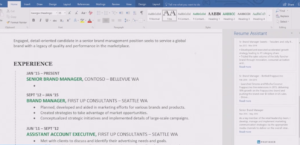Big announcement today coming out Microsoft/LinkedIn. The two companies are figuring out more and more how to integrate LinkedIn into the Microsoft office ecosystem and their new Resume Assistant is the first major feature announcement.
What’s Resume Assistant?
Microsoft’s Resume Assistant is a Word product integration that brings the power of LinkedIn directly into Word when you’re crafting or updating your resume.
How does Resume Assistant work?
It’s pretty easy. You upload or open an existing resume, made an old resume you have, and Word will automatically recognize that document is a resume and open up the LinkedIn integration. The integration pops up as a right-side window in Word so that your resume is on one side of Word and the LinkedIn Resume Assitant is on the other.
From here, Resume Assistant will do a lot of things but mostly use artificial intelligence to help you craft a better resume that will more likely be selected for jobs by recruiters. Resume Assistant does this through analyzing LinkedIn data of those profiles, work experiences, titles, etc. that are getting hired and moving into new roles via profile changes.
Don’t know how to phrase your work experience? The Resume Assistant will pull in specific examples, similar to you, of people who got hired and show you phrases, skills, and words that will help you get hired. RA will also easily allow you to go directly to other profiles on LinkedIn from Word to see how others have structured their profile.
Why is this a big deal?
So, Microsoft and LinkedIn shared a bunch of data that led to this product creation:
- LinkedIn data shows ‘job hopping’ has doubled in the past twenty years
- LinkedIn is seeing 40% growth in job applies through LI
- On average 100 candidates are applying for each position on LinkedIn
- 80% of resume updates in the U.S. happen in Microsoft Word
Okay, and, so?!
Connect the dots! One part of the Resume Assistant is to also show each Word user updating their resume the jobs that most match the resume being created. So, 80% of job seekers will have LinkedIn’s 11 million jobs showing up in Word, right next to their resume while they’re updating and thinking about looking for a new job!!!
I would not want to be a job board today and be reading this. In fact, for how much Google has been swinging its weight around recently, this is also a pretty big punch back from LinkedIn and Microsoft to let them know they are not giving job search away!
Game changer!
Think about how many people use Microsoft Word. 100% of those people will now have a direct link to LinkedIn and the LI jobs when they are doing anything with their resume – Resume Assistant opens automatically when a resume is detected. It’s really a genius move by LI and MS.
If this is the first integration that the two sides have figured out, I can’t wait to see future integrations as well, and from the sound of things, both sides are moving quickly to make these a realities.
One note of importance. Resume Assistant will launch today for Microsoft 365 Insiders, at the beginning of 2018 for all Microsoft 365 users, and soon after for all other Word platforms.

